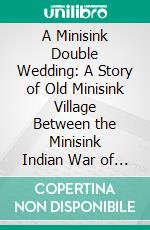Stickney eBooks
eBooks di Stickney di Formato Pdf
A Minisink Double Wedding: A Story of Old Minisink Village Between the Minisink Indian War of 1754-8, and the French and Indian War of 1763-5. E-book. Formato PDF Charles E. Stickney - Forgotten Books, 2017 -
The following story is laid in Jersey Miuisink, as the part of old Minisink east of the Delaware river was once called. Old Minisink was the land of the Minsi. or. as the Dutch settlers called them. Mnusey Indians. They inhabited the Delaware river valley between the Pahoqtialin mountains on the east in New Jersey, now called the Blue mountains. and the Kittatinny mountains on the west in Pennsylvania; and extending from the Water Gap to Rose's point by the Nevcrsink River valley, and to Lacknwaxeu on the upper Delaware.The Mnusey of the German settlers, or in English the Minsi Indians, were the third division of the Letini Lenape or Delaware tribe. The first and ruling division was the Unami (Tortoise); the second the Wunslichtgo (Turkey); the third the Minsi (Wolf). The first inhabited New Jersey south and east of Pahoqualin mountain to the Atlantic ocean; the second occupied all the mountainous region south of the country of the Acquanaschioih, or Five (Six) Nations in Pennsylvania and part of Ohio, and were termed the Highlanders; the third occupied as we have seen, the Delaware and Neversink river flats and were termed the Lovvlanders. The three divisions each spoke a different dialect, yet could understand each other. They were also easily distinguished by their accent and the tribal totem which each warrior usually kept displayed in a sketch upon his person or arms. Thus at the capture of Wyltwyek (Kingston) by the Indians in September, 1663, the Dutch people easily recognized the Mnusey Indians among their assailants.The Minisink war was undertaken by the Delawares, sanctioned by the Six Nations, against the settlers in Pennsylvania Minisink for frauds perpetrated on them, and it was settled by Teedyuscnng in 1758. The French war began about 1764 and was carried on by predatory bands of warriors instigated by the wars between the English colonies and the French colony in Canada. After the English captured Canada there was a short cessation of Indian troubles, later revived by the Revolutionary war.During all these early wars there resided a considerable number of white people in Jersey Miuisink, who. besides the Indian wars, were involved for half a century in a struggle between the states of New York and New Jersey, as to which of them owned the lauds in that region. This arose from a dispute over the boundary line between the states.The scene of our story is laid in the disputed laud district. The states agreed that the line between them should begin on the Hudson river in latitude 41 degrees and 40 minutes, and should run to the most northern branch of the Delaware river.
Poems on Lake Winnipesaukee. E-book. Formato PDF Julia Noyes Stickney - Forgotten Books, 2017 -
This fragment of a collection of poetical sketches will be followed by some prose-poetic letters recalling the delightful summer of 1884 to some, who love to linger by the enchanted waters of Lake Winnipesaukee, and to many who heard the voice of song, and the glowing words of truth in the Grove-Meetings.I also offer these few poetic pictures to those who dream of wandering, while on earth, "In green pastures, beside the still waters." There scenes of beauty dispel care, and moonlight and starlight shine on enchanted islands. There morning reveals forms of mountains and forests by waters as blue as the famed Mediterranean Sea.There Chocorua and Ossipee, loved by painter and poet, fix the beauty-haunted eye.
The Stickney Family: A Genealogical Memoir of the Descendants of William and Elizabeth Stickney From 1637 to 1869. E-book. Formato PDF Matthew Adams Stickney - Forgotten Books, 2017 -
The Normans when they came into England, at the con quest, brought in the use of surnames taken from the places they were from, or possessed, with the prefix de (norman-french). The eldest son continued to bear it (frequently dropping the de) as long as the family existed. According to Camden it was the custom of the Normans' younger sons to take a surname from the villages or cities, which, in very early times, their fathers bestowed upon them; and so I account for a Norman taking the surname of Stickney.


